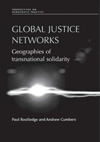Introducing Paul Routledge
 Paul Routledge is Reader at the School of Geographical and Earth Sciences of the University of Glasgow. In the past, he worked at Harvard University, the Albert Einstein Institution in Cambridge (MA, US) and the University of Bristol. Paul obtained his PhD in Geography at Syracuse University. Dr Routledge further holds a BSc and MSc in Geography, from respectively Kingston Polytechnic and London School of Economics and Political Science.
Paul Routledge is Reader at the School of Geographical and Earth Sciences of the University of Glasgow. In the past, he worked at Harvard University, the Albert Einstein Institution in Cambridge (MA, US) and the University of Bristol. Paul obtained his PhD in Geography at Syracuse University. Dr Routledge further holds a BSc and MSc in Geography, from respectively Kingston Polytechnic and London School of Economics and Political Science.
The research interests of Dr Routledge include the political economy of development within Asia, the spatiality of resistance and the mediation of social movement behaviours and practices.
Geopolitical Passport
Your relationship with geopolitics
At what age did you discover geopolitics and what attracted you to it?
 1983. I was 27 years old. It was at the height of the Cold War. F111 jets took off from Upper Heyford US Air Force Base in the UK.
1983. I was 27 years old. It was at the height of the Cold War. F111 jets took off from Upper Heyford US Air Force Base in the UK.
I was participating in four days of nonviolent blockades of the Upper Heyford US Air Force Base in the UK organised by the Campaign for Nuclear Disarmament in protest against NATO’s decision to deploy Cruise missiles in the UK and elsewhere in Europe. 4000 anti-nuclear campaigners demonstrated over the four days. It lead to 752 arrests and was one of the largest ever set-piece civil disobedience demonstrations in UK history.
I read historian EP Thompson who argued that the Cold War should be seen as a means by which the dominant states within each bloc controlled and disciplined their own citizens, and served as legitimization for both U.S. and USSR intervention in other states, their appropriation of vast resources for military purposes, and for keeping powerful elites in both blocs in power.
Geopolitically the peace movements of the Western bloc, and the dissident movements of the Eastern bloc articulated material challenges to superpower militarism and an intellectual challenge to the geopolitical othering that the Cold War was predicated upon. Their calls for international solidarity were seen as a threat to the power of political elites within each bloc to determine geopolitical spheres of influence. From then on the geopolitics of resistance and solidarity became my abiding interests.
Which geopolitical topics have your focus and why did you choose especially these?
I focus on the resistance practices of social movements as they challenge the power of states, international institutions, and transnational corporations.
The histories of geopolitics have tended to focus upon the actions of states and their elites, overemphasizing statesmanship and understating rebellion. However, the geopolitical policies enacted by states, and the discourses articulated by their policy makers have rarely gone without some form of contestation by those who have faced various forms of domination, exploitation, and/or subjection which result from such practices.
Indeed, myriad alternative stories can be recounted which frame history from the perspective of those who have engaged in resistance to the state and/or the practices of geopolitics. These histories keep alive the memory of people’s resistances, and in so doing, suggest new definitions of power that are not predicated upon military strength, wealth, command of official ideology, and cultural control.
Further, I focus upon movements with whom I participate in some way, hence speaking from within the practices of resistance.
What do you consider your most important contribution to geopolitics?
This is really for others to say. However, I did raise the issue of the importance of the practices of social movements for geopolitics (see previous two questions and next one).
Your geopolitical preferences
What is your favourite definition of geopolitics?
‘Alter-geopolitics’: that which emanates from subaltern (i.e. dominated) positions within society that challenge the military, political, economic, and cultural hegemony of the state and its elites. These challenges are counter-hegemonic struggles in that they articulate resistance to the coercive force of the state – in domestic and/or foreign policy – as well as withdrawing popular consent to be ruled ‘from above’.
Alter-geopolitics can be conceived as an ambiguous, political and cultural force within civil society that articulates three interrelated forms of counter-hegemonic struggle. First, it challenges the material (economic and military) geopolitical power of states and global institutions; second, it challenges the representations imposed by political elites upon the world and its different peoples, that are deployed to serve their geopolitical interests; third it poses creative alternatives to business-as-usual hegemonic geopolitical practices.
(Note: The concept ‘alter-geopolitics’ has been developed by Sara Koopman, University of British Columbia).
Which geopolitical scientist do you admire the most?
Noam Chomsky and Arundhati Roy because they represent fearless exemplars of the representational challenges posed by geopolitical intellectuals to the actions of their own governments.
Subcommandante Marcos: because he represents a poetic exemplar of the material resistance and creative alternatives articulated by geopolitics from below.
What is your favourite geopolitical book?
“Memory of Fire” by Eduardo Galeano. A masterpiece of Latin American literature, that, in a series of vignettes pieced together like a mosaic over 900 pages, bears witness to the history of the Americas, from the creation stories of the indigenous peoples of the continent, to 1986 when his exile from the Uruguayan dictatorship ended.
The book has many geopolitical dimensions, commenting on upon capitalism, colonialism, slavery, imperialism, resistance, art, poetry and music.
What is your favourite geopolitical website?
Indymedia, an activist eye on geopolitical events. Not without its faults and biases, but a healthy alternative to the corporate media: Indymedia
The geopolitical future
In what direction(s) will geopolitical science be heading the coming decades?
One obvious direction will be charting the geopolitical actions of the BRIC countries in challenging US hegemony.
Another and associated direction will be investigating the intra-state and inter-state conflicts over water, land, and energy resources, and the role of transnational corporations and institutions in such conflicts.
My own interests lay in the geopolitics of climate change, as it impacts the aforementioned conflicts, and the responses from social movements to these dynamics.
Which geopolitical subject has been too little in the spotlight and needs further research?
Alter-geopolitics, see fourth question.
What will be the largest geopolitical challenge for the world in the 21st century?
The threats posed by climate change and capitalism to the biosphere and to the well-being of the majority of people on the planet.
